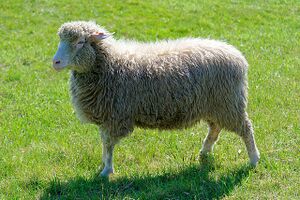Badul nouns: daut: Difference between revisions
Jump to navigation
Jump to search
| (15 intermediate revisions by the same user not shown) | |||
| Line 1: | Line 1: | ||
===Etymology=== | ===Etymology=== | ||
From Middle Badul ''daut'', from Old Badul ''dawt'', from Vulgar Ucerian ''davht'', from Ucerian ''damt'', from Areric '' | From Middle Badul ''daut'', from Old Badul ''dawt'', from Vulgar Ucerian ''davht'', from Ucerian ''damt'', from Areric ''damet'', from Proto-Bintic ''*dametos''. Cognate with Narn ''dafad'' (sheep, singular). | ||
[[File:Daut.jpg|thumb|daut]] | |||
===Pronunciation=== | ===Pronunciation=== | ||
| Line 14: | Line 16: | ||
===Definition=== | ===Definition=== | ||
====Noun==== | ====Noun==== | ||
'''daut''' | '''daut''' | ||
# a [https://dictionary.cambridge.org/dictionary/english/deer sheep]. | # a [https://dictionary.cambridge.org/dictionary/english/deer sheep]. | ||
#: ''Lag na '''datu''' | #: ''Lag na '''datu''' am toyani''. | ||
#: ''The '''sheep''' stayed in their pens''. | #: ''The '''sheep''' stayed in their pens''. | ||
====Derived terms==== | ====Derived terms==== | ||
''' | '''vaimtsikang''' | ||
# | # A [[wiktionary:musical|musical]] [[wiktionary:entertainment|entertainment]] in which several [[wiktionary:voice|voices]] or [[wiktionary:instrument|instruments]] take part; a [[wiktionary:concert|concert]]. | ||
From | From ''vaim''("music") + ''tsikang'' ("theatre"). | ||
====Notes==== | ====Notes==== | ||
The word ''daut'' has an irregular plural. In Badul, plurals end in ''-an'' but this word's plural ends in a ''u''. This dates back to Ucerian, where nouns with the -u stem had the accusative singular plural suffix of ''-u''. For some reason it took over its nominative counterpart ''-ae''. It kept this old plural construction due to its high usage | The word ''daut'' has an irregular plural. In Badul, plurals end in ''-an'' but this word's plural ends in a ''u''. This dates back to Ucerian, where nouns with the -u stem had the accusative singular plural suffix of ''-u''. For some reason it took over its nominative counterpart ''-ae''. It kept this old plural construction due to its high usage. Even when the regular plural suffix changed, it was still kept and using the new plural suffix didn't feel correct. | ||
===Declension=== | ===Declension=== | ||
| Line 50: | Line 52: | ||
|- | |- | ||
! style="background:#eff7ff" | genitive | ! style="background:#eff7ff" | genitive | ||
| bir ''' | | bir '''dwit''' | ||
| whil ''' | | whil '''daut''' | ||
|- | |- | ||
! style="background:#eff7ff" | dative | ! style="background:#eff7ff" | dative | ||
| Line 72: | Line 74: | ||
|- | |- | ||
! style="background:#eff7ff" | genitive | ! style="background:#eff7ff" | genitive | ||
| an ''' | | an '''dwit''' | ||
| na ''' | | na '''daut''' | ||
|- | |- | ||
! style="background:#eff7ff" | dative | ! style="background:#eff7ff" | dative | ||
Latest revision as of 06:13, 21 September 2024
Etymology
From Middle Badul daut, from Old Badul dawt, from Vulgar Ucerian davht, from Ucerian damt, from Areric damet, from Proto-Bintic *dametos. Cognate with Narn dafad (sheep, singular).
Pronunciation
- (stressed)
- IPA: /daʊt/
- (unstressed)
- IPA: /dəʊt/
- Rhymes: -aʊt
Definition
Noun
daut
- a sheep.
- Lag na datu am toyani.
- The sheep stayed in their pens.
Derived terms
vaimtsikang
- A musical entertainment in which several voices or instruments take part; a concert.
From vaim("music") + tsikang ("theatre").
Notes
The word daut has an irregular plural. In Badul, plurals end in -an but this word's plural ends in a u. This dates back to Ucerian, where nouns with the -u stem had the accusative singular plural suffix of -u. For some reason it took over its nominative counterpart -ae. It kept this old plural construction due to its high usage. Even when the regular plural suffix changed, it was still kept and using the new plural suffix didn't feel correct.
Declension
Declension of daut
| Indefinite | ||
|---|---|---|
| Singular | Plural | |
| nominative | bir daut | whil datu |
| accusative | bir daut | whil datu |
| genitive | bir dwit | whil daut |
| dative | bir daut | whil dati |
| Definite | ||
| Singular | Plural | |
| nominative | an daut | na datu |
| accusative | an daut | na datu |
| genitive | an dwit | na daut |
| dative | an daut | na dati |
